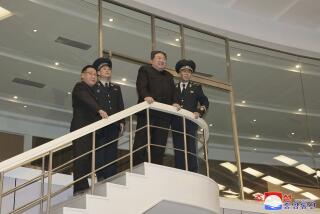Korea Spy Incident Turns Bloodier
- Share via
TOKYO — A violent espionage drama between the two Koreas deepened Thursday as Southern forces killed a total of seven infiltrators from the enemy North and a captured spy confessed that his side had conducted intelligence operations on South Korean air defense systems.
The casualties brought to 18 the number of North Koreans left dead after their submarine ran aground near the eastern city of Kangnung on Wednesday in what Seoul is calling Pyongyang’s worst provocation in nearly 30 years. One South Korean soldier was wounded by a hand grenade.
And early today, news reports said another infiltrator appeared ready to surrender after a gun battle in a rugged mountain area around Kangnung.
An autopsy of 11 other North Koreans found dead Wednesday confirmed that they had not committed suicide en masse, as originally suspected, but were shot in the back of the head, South Korean media reported. The fatal weapon, an AK-47 rifle, was not recovered at the site--leading authorities to say they suspect that the men had been killed by a comrade who then fled.
South Korean security forces, in a huge dragnet mobilizing thousands of troops, helicopters, roadblocks and tracking dogs, continued to pursue as many as six other infiltrators.
Lee Kang Soo, 31, the captured North Korean, had initially told interrogators that the submarine carried 20 men but later increased that number to 25.
He said five more North Koreans had been dropped off on South Korea’s eastern coast after leaving the North on Monday.
He said their submarine ran aground while trying to pick up the men in a coastal rendezvous, South Korean media reported.
Lee said the same 330-ton submarine had been sent to Kangnung four times to collect intelligence on the area’s civilian air defense systems, Korean news media reported.
But South Korean authorities said the North Korean objective may have been sabotage. South Korean news agencies received an official request to describe the North Koreans in a more serious fashion--as “armed guerrillas,” rather than as spies or infiltrators.
Authorities said the North Koreans may have been planning to commit sabotage disguised as Southerners. South Korean military fatigues, an M-16 rifle and a hand grenade were found at one mountain site.
The seven North Koreans killed Thursday also wore South Korean-manufactured clothing, including jeans, casual shirts and sneakers.
A special investigative team of the American-led United Nations Command in Seoul confirmed that the submarine and its occupants belonged to the North Korean People’s Army.
The U.N. Command attempted to pass a protest message to a representative of the North’s army on Thursday at the truce village of Panmunjom in the demilitarized zone between the two enemies.
The message charged Pyongyang with “clear and flagrant” violations of the agreement that governs the truce between the two Koreas and is overseen by the U.N. Command, which demanded steps to prevent a recurrence.
“If you fail to do so, the responsibility for the unfortunate consequences will be yours,” the message from Maj. Gen. Cha Ki Moon of the U.N. Command said.
But Lt. Gen. Ri Chan Bok of the North Korean army refused to accept the message.
Wednesday’s incident has outraged South Koreans, who recently sent rice to the faltering regime said to be suffering from acute shortages of food and fuel.
Although Pyongyang recently hosted an international forum to woo foreign investors to the northern free trade port of Rajin, analysts said the espionage incident has underscored the Communist regime’s duplicity and deepened suspicions that it has not abandoned aims to unify the country by force.
South Korean security officials said some of the sub’s capabilities had been deliberately destroyed as they began operations to haul it off to port.
The South Korean media featured the critical roles that local villagers had played in the quick discovery of the guerrillas.
A taxi driver discovered the sub, while a man picking mountain mushrooms first sighted three of the men later killed by Southern forces and reported their whereabouts.
Chung Soon Ja, a homemaker, recounted how Lee, the captured North Korean, had approached her isolated village in search of food.
She told reporters that she immediately knew he was North Korean by his accent and damp clothes smeared with mud.
She said she played dumb with casual chatter about mushroom hunting. She brought him to her home, then secretly called police.
When they arrived, she said Lee pulled out a gun, but the three officers and her husband overwhelmed him.
Chi Jung Nam of The Times’ Seoul Bureau contributed to this report.
More to Read
Sign up for Essential California
The most important California stories and recommendations in your inbox every morning.
You may occasionally receive promotional content from the Los Angeles Times.














